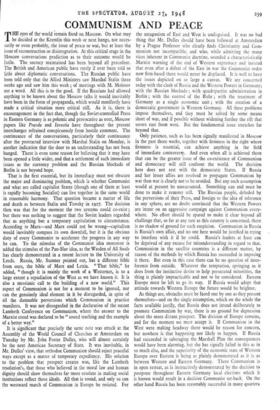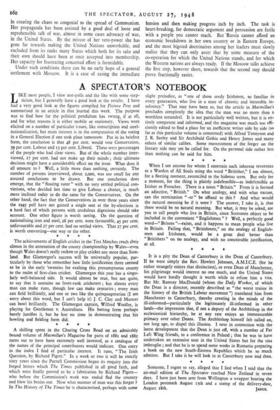COMMUNISM
AND PEACE
THE eyes of the world remain fixed on Moscow. On what may be decided at the Kremlin this week or next hangs, not neces- sarily or even probably, the issue of peace or war, but at least the issue of reconstruction or disintegration. At this critical stage in the Moscow conversations prediction as to their outcome would be futile. The secrecy maintained has been beyond all precedent. The British and American public have rarely if ever been told so little about diplomatic conversations. The Russian public have been told only that the Allied Ministers saw Marshal Stalin three weeks ago and saw him this week ; of meetings with M. Molotov not a word. All this is to the good. If the Russians had allowed anything to be known about the Moscow talks it would inevitably have been in the form of propaganda, which would manifestly have made a critical situation more critical still. As it is, there is encouragement in the fact that, though the Soviet-controlled Press in Eastern Germany is as polemic and provocative as ever, Moscow papers like Pravda and Izvestia have throughout the present interchanges refrained conspicuously from hostile comment. The continuance of the conversations, particularly their continuance after the protracted interview with Marshal Stalin on Monday, is another indication that the door to an understanding has not been banged. There is even some reason for believing that it may have been opened a little wider, and that a settlement of such immediate issues as the currency problem and the Russian blockade of Berlin is not beyond hope.
That is the first essential, but its immediacy must not obscure the major and dominating problem, which is whether Communist and what are called capitalist States (though one of them at least is rapidly becoming Socialist) can live together in the same world in reasonable harmony. That question became a matter of life and death as between Stalin and Trotsky in 1927. The decision then was that for the moment the two systems could co-exist ; but there was nothing to suggest that the Soviet leaders regarded that as anything but a temporary capitulation to circumstance. According to Marx—and Marx could not be wrong—capitalism would inevitably compass its own downfall, but it is the obvious duty of every Communist to accelerate the progress in any way he can. To the stimulus of the Communist idea moreover is added the stimulus of the Pan-Slav idea, as the Warden of All Souls has clearly demonstrated in a recent lecture to the University of Leeds. Russia, Mr. Sumner pointed out, has a different bible from ours, the bible of Marx and Lenin. " That bible," he added, " though it is mainly the work of a Westerner, is to a large extent a repudiation of the West as we have known it. It is also a messianic call to the building of a new world." This aspect of Communism is not for a moment to be ignored, nor can the genuinely ideal element in it be disregarded, in spite of all the damnable perversions which Communism in practice manifests. It was not disregarded in the declaration of the recent Lambeth Conference on Communism, where the answer to the Marxist creed was declared to be " sound teaching and the example of a better way."
It is significant that precisely the same note was struck at the Assembly of the World Council of Churches at Amsterdam on Tuesday by Mr. John Foster Dulles, who will almost certainly be the next American Secretary of State. It was inevitable, in Mr. Dulles' view, that orthodox Communism should reject peaceful ways except as a matter of temporary expediency. His solution to the problem that prospect creates was, like the Lambeth resolution's, that those who believed in the moral law and human dignity should show themselves far more resolute in making social institutions reflect those ideals. All that is sound, and only so can the westward march of Communism in Europe be resisted. For the antagonism of East and West is undisguised. It was no bad thing that Mr. Dulles should have been followed at Amsterdam by a Prague Professor who clearly finds Christianity and Com- munism not incompatible, and who, while admitting the many vices inherent in Communist doctrine, sounded a characteristically Marxist warning of the end of Western supremacy and insisted that even after a defeat of the East in war the Communist order now firm-based there would never be displaced. It is well to have the issues depicted on so large a canvas. We are concerned today with the clash of Russia and the Western Powers in Germany; with the Russian blockade ; with quadripartite administration in Berlin ; with the control of the Ruhr ; with the treatment of Germany as a single economic unit ; with the creation of a democratic government in Western Germany. All these problems impose themselves, and they must be solved by some means short of war, and if possible without widening further the rift that severs east from west. But the fundamental issue stretches far beyond that.
Only patience, such as has been signally manifested in Moscow in the past three weeks, together with firmness in the right where firmness is essential, can achieve anything in the field of immediate controversy. And even when all is achieved there that can be the greater issue of the co-existence of Communism and democracy will still confront the world. The decision here does not rest with the democratic States. If Russia and her lesser allies are resolved to propagate Communism by war then war is clearly not to be avoided. But any such assumption would at present be unwarranted. Something can and must be done to make it remoter still. The Russian people, deluded by the perversions of their Press, and foreign to the idea of tolerance in any sphere, are no doubt convinced that the Western Powers are intent on an aggressive campaign against Communism every- where. No effort should be spared to make it clear beyond all challenge that, so far at any rate as this country is concerned, there is no shadow of ground for such suspicion. Communism in Russia is Russia's own affair, and no one here would be justified in trying to interfere with it if he could. Russia's leaders at least can be deprived of any excuse for misunderstanding in regard to that.
Communism in the satellite countries is a different matter, by reason of the methods by which Russia has succeeded in imposing it there. But even in this case there can be no question of inter- ference from outside. Whatever the temptation, springing as it does from the instinctive desire to help persecuted minorities, the thing is plainly impracticable and not to be considered. Eastern Europe must be left to go its way. If Russia would adopt that attitude towards Western Europe the future would be brighter.
As things are, obstacles must be faced one by one as they present themselves—and on the single assumption, which on the whole the facts available justify, that Russia does not intend deliberately to promote Communism by war, there is no ground for depression about the more distant prospect. The division of Europe remains, and for the moment we must accept it. If Communism in the West were making headway there would be reason for concern, but nowhere is that happening nor likely to happen. If Russia had succeeded in sabotaging the Marshall Plan the consequences would have been alarming, but she has signally failed in this as in so much else, and the superiority of the economic state of Western Europe over Eastern is being as plainly demonstrated as it is as between Western and Eastern Germany. There Communism is in open retreat, as is instructively demonstrated by the decision to postpone throughout Eastern Germany local elections which it is known would result in a decisive Communist set-back. On the other hand Russia has been reasonably successful in many quarters in creating the chaos so congenial to the spread of Communism. Her propaganda has been assisted by a good deal of loose and reprehensible talk of war, almost in some cases advocacy of war, in the United States. By the misuse of her veto-power she has gone far towards making the United Nations unworkable, and excluded from its ranks many States which both for its sake and their own should have been at once accepted into membership. Her capacity for frustrating concerted effort is formidable.
Under such conditions there can be no early hope of a general settlement with Moscow. It is a case of easing the immediate tension and then making progress inch by inch. The task is heart-breaking, for democratic argument and persuasion are futile with a people you cannot reach. But 'Russia cannot afford an economic breakdown in her own country or in Eastern Europe, and the most bigoted doctrinaires among her leaders must slowly realise that they can only avert that by some measure of the co-operation for which the United Nations stands, and for which the Western nations are always ready. If the Moscow talks achieve the first step, however short, towards that the second step should prove fractionally easier.



































 Previous page
Previous page